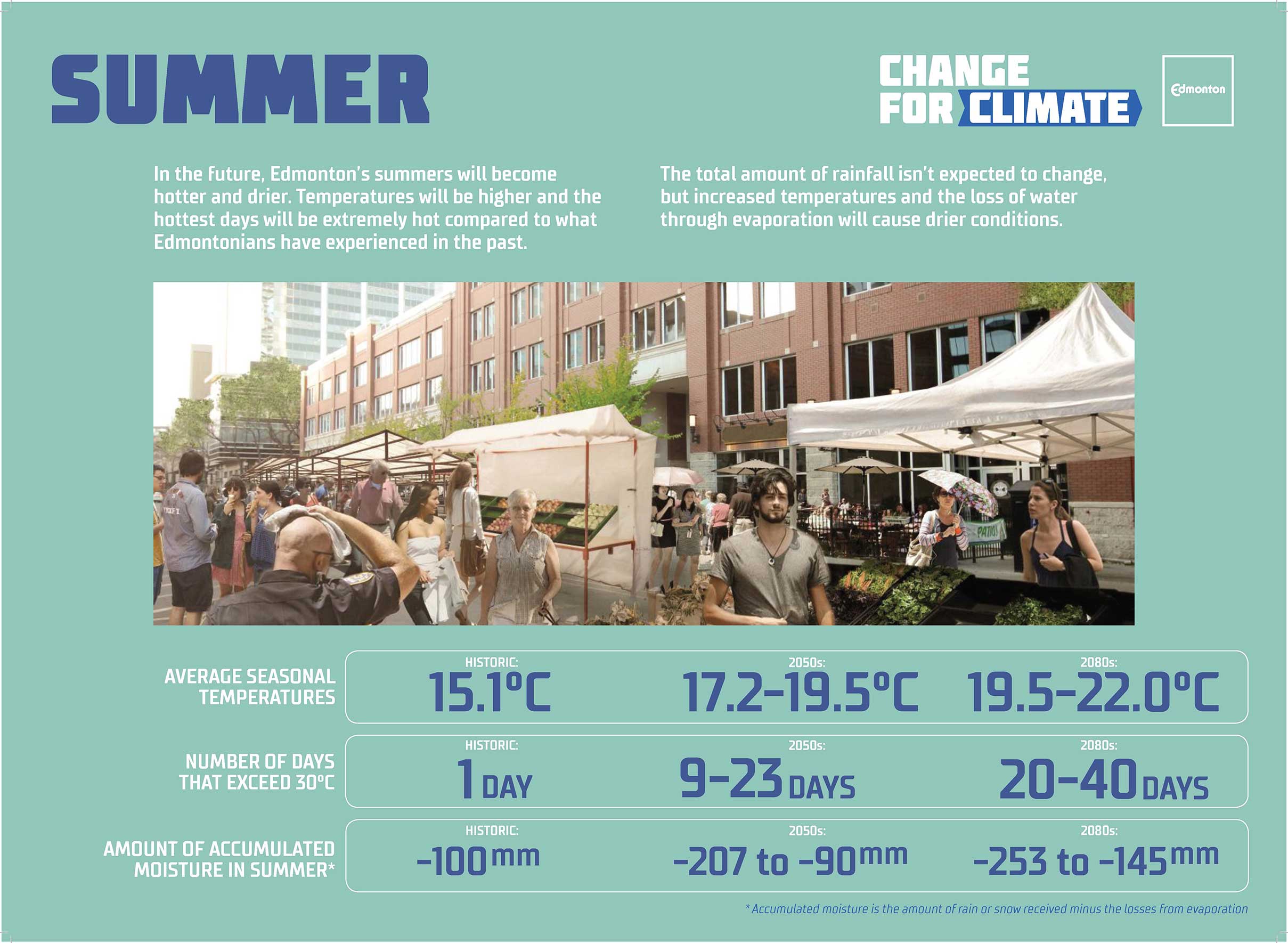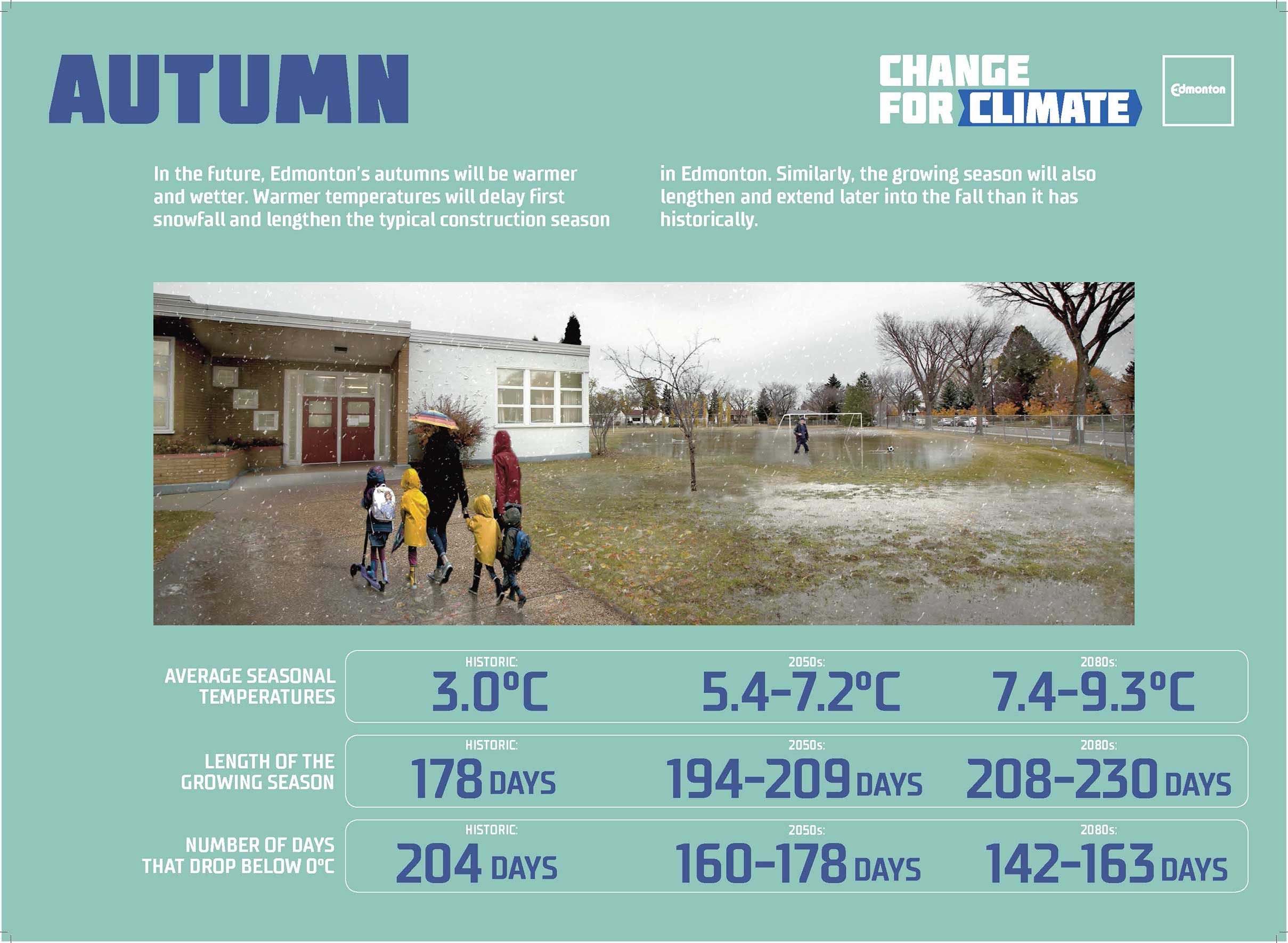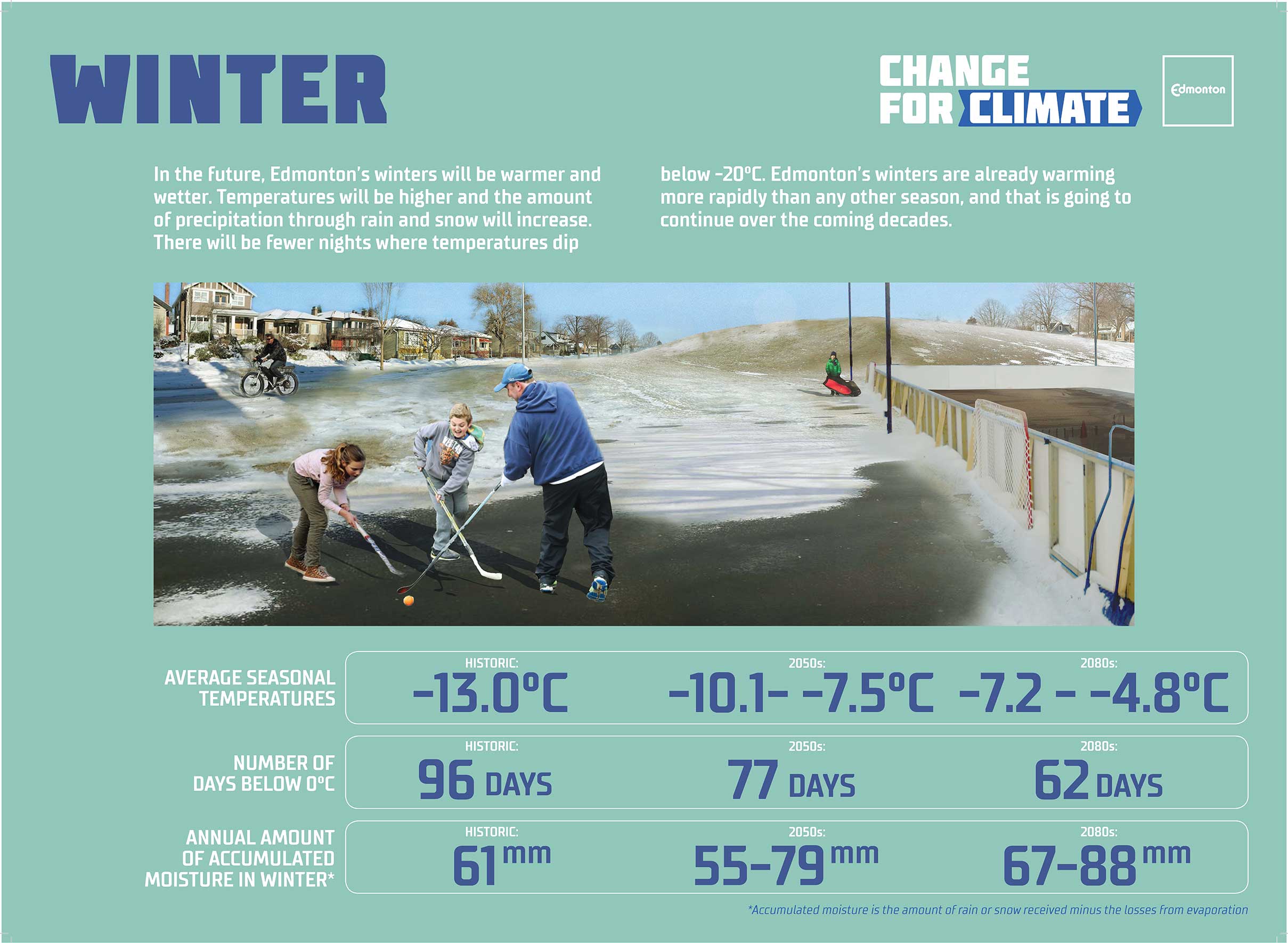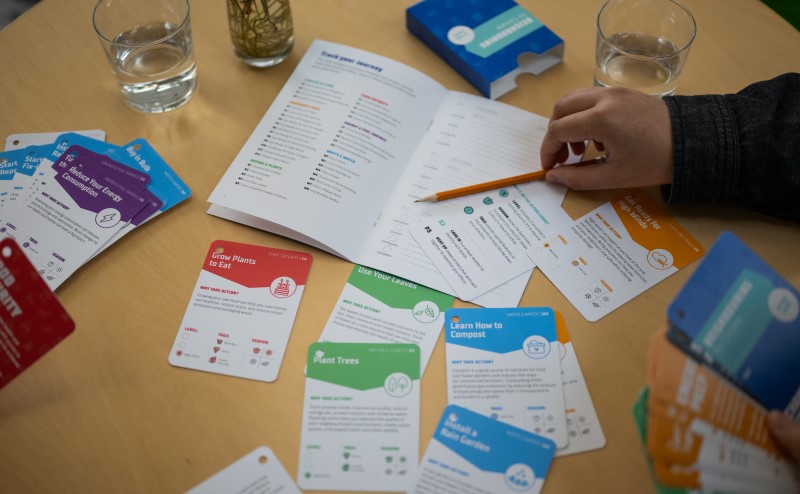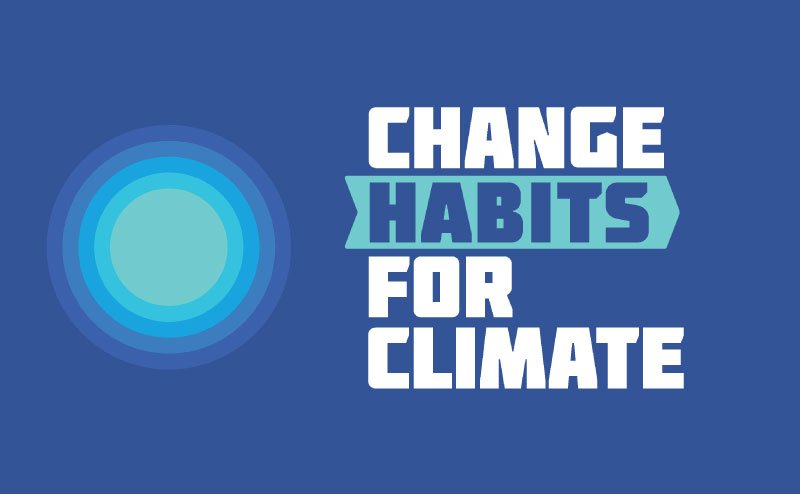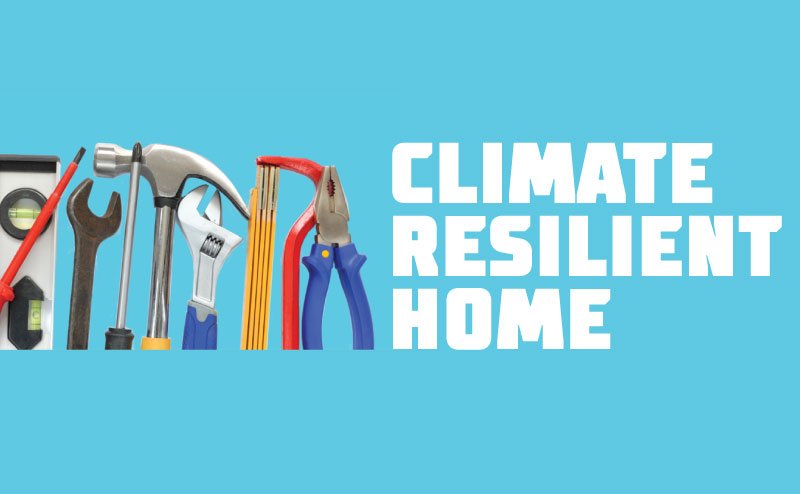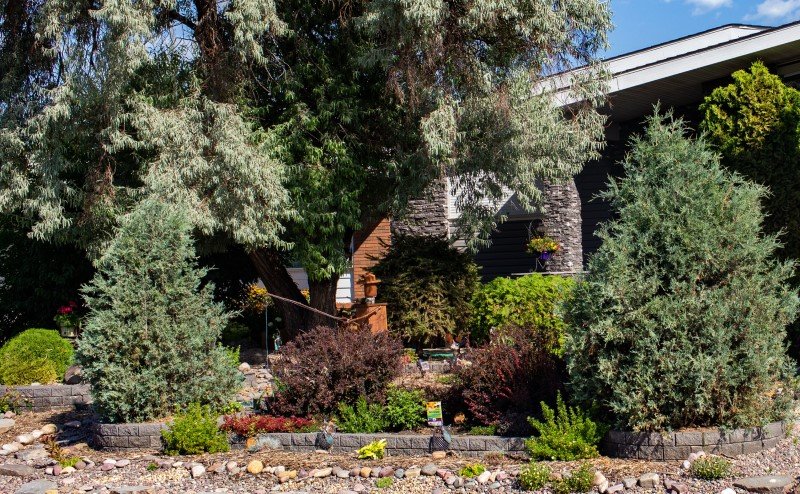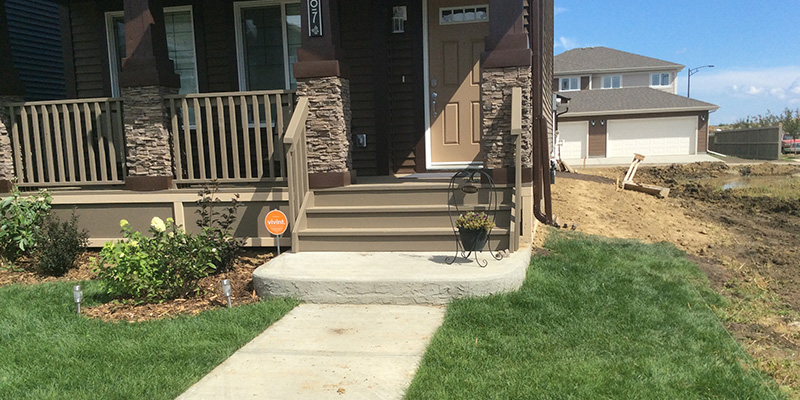A resilient city for a changing climate
Edmonton’s climate is already changing. We are experiencing hotter summers, more wildfire smoke, heavier rainstorms, and drier winters. These shifts affect our health, homes, businesses, natural environments, and fundamentally alter our way of life.
The City of Edmonton is responding with a clear focus on adaptation—taking action now to prepare for current and future climate impacts. These actions also bring co-benefits, such as cleaner air, greener neighbourhoods, and healthier communities.
Edmonton’s Adaptation Strategy
Our Climate Resilient Edmonton: Adaptation Strategy and Action Plan provides a roadmap to help the city manage climate risks. The plan is reviewed every five years and guides actions that protect:
- People - protecting health, safety, community, and culture during extreme events through emergency planning.
- Infrastructure - designing neighbourhoods, buildings, roads, and drainage systems that are resilient to changing the climate.
- Nature - strengthening parks, trees, river valleys, and wetlands to buffer climate impacts.
- Economy and Services - ensuring business and city service continuity, even amidst disruptions.
Key Ongoing Adaptation Actions
- Poor Air Quality Events Preparedness: To ensure residents remain safe and connected during heatwaves and wildfire smoke events, cooling centres, water stations, and N95 masks are available at various facilities including libraries, recreation centres, outdoor pools, Muttart Conservatory, and Valley Zoo.
- Tree Planting and Naturalization: Trees offer many benefits, such as shade, reduced flood risks, improved air quality, and carbon absorption. The City aims to plant two million trees by 2030, expanding both tree plantations and naturalization areas, and to increase urban canopy coverage by 20 per cent by 2071.
- Wildfire Resilience: A Wildland Urban Interface Wildfire Risk Strategy is being developed, focusing on the FireSmart discipline, to protect neighbourhoods and infrastructure near forests and grasslands. This initiative will also safeguard air quality and mitigate health risks.
- Climate Resilient Neighbourhood Design: The Climate Resilience Planning and Development Action Plan initiative is leading 15 actions focused on Resilient Neighbourhoods, Resilient Site and Landscaping Design, Resilient Buildings, and Resilient City Processes. This initiative ensures new developments incorporate shade, green landscaping, and stronger building standards to withstand extreme weather. This work advances the city’s ongoing efforts to address climate change, as detailed in Climate Resilient Edmonton: Adaptation Strategy and Action Plan and Edmonton’s Community Energy Transition Strategy And Action Plan.
- Change For Climate: Whether you own or rent, our Change For Climate guides offer excellent tips for reducing environmental impact and even saving some money.
Edmonton: A city built to last
Adaptation efforts extend beyond risk mitigation, fostering a healthier, greener and more connected urban environment. Through strategic tree planting, the development of resilient neighbourhoods and proactive emergency programs, Edmonton's future is secured as a safe, vibrant and livable city for generations.
Edmonton's Changing Climate
Climate models show that as the climate warms, the four seasons in Edmonton will be different from what we have experienced in the past.
Understanding Edmonton’s Changing Climate 2025: Observed Climate Trends
Climate Resilient Business
Learn how the Climate Resilient Business tool can help small or medium sized businesses prepare for climate change and help improve their resilience and increase competitiveness and profitability.
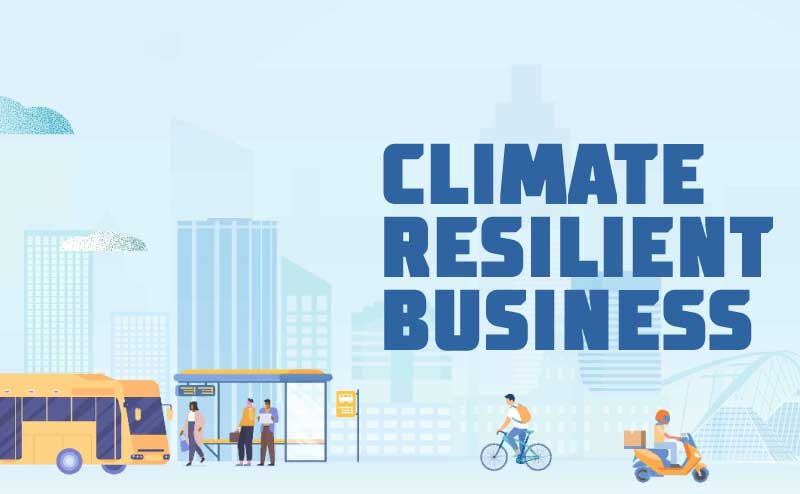
Climate Resilient Business
An interactive tool to help you to prepare your business for a changing climate. Use the Climate Resilient Business Guide or the Summary Guide alongside the interactive website.
The Climate Resilient Edmonton: Adaptation Strategy and Action Plan was developed to help the city prepare for the impacts of climate change and protect the community, infrastructure and services. Working with the advice of Edmontonians, the strategy suggests actions to make Edmonton resilient to the effects of climate change.
Beginning in 2016, the City and various stakeholders worked together to develop the strategy. Climate Resilient Edmonton was presented to the Executive Committee of City Council in November 2018. Implementation began soon after.
Implementing actions within the strategy and action plan are ongoing.
The results of an Edmonton-specific climate risk and vulnerability assessment led to numerous workshops with stakeholders and subject matter experts to further distill and refine the information.
Edmonton’s academic, business, public institution and government communities came together to discuss the climate risks and vulnerabilities facing Edmonton and opportunities and risks the city should prepare for. Through 10 themed workshops, 17 assets and service areas were considered in relation to climate hazards (such as extreme heat, extreme cold, hail, and so on). At the 10 workshops, conversations and ideas presented by participants were captured by a graphic artist, each of which is presented here.
Air and Fuel Supply Graphic Summary
Buildings and Waste Graphic Summary
Economy and Culture Graphic Summary
Electricity and Information/CommunicationGraphic Summary
Emergency Management Graphic Summary
Natural Environment Graphic Summary
Before the City could begin to develop a strategy, it needed to better understand how Edmonton's climate is changing, as well as the risks and opportunities these changes present for the community. To support this understanding, the following research reports were commissioned.
Related Reports
Paper 1: Economics and Finance
Paper 4: Transformational Adaptation
Paper 5: Transportation Infrastructure
Paper 7: Energy and Information and Communications Technology
Research and Strategies to Support Implementation
Together, Edmonton’s Energy Transition Strategy and Climate Resilient Edmonton: Adaptation Strategy and Action Plan will move us closer to becoming a climate-resilient city.
Edmonton’s Community Energy Transition Strategy & Action Plan
First released in 2015, the strategy was updated in 2021 to accelerate efforts to become a low-carbon city.
This accelerated effort will lead to lowering the creation and release of greenhouse gas emissions and an increased reliance upon renewable energy for heating and fuelling purposes.
Climate Resilient Edmonton: Adaptation Strategy and Action Plan
Presented in 2018, the action plan identifies a number of pathways for Edmonton to adapt to a changing climate.
Glossary and Terms
Green Roofs
As the climate warms, we'll be feeling the heat. Concrete buildings and pavement hold heat, creating a “heat island effect” where urbanized areas are warmer than their surrounding rural counterparts. This is especially felt downtown. Plants are an effective way to moderate the temperature, serve as insulation from heat or cold and can slow the flow of heavy rain.
The City has worked with the Miistakis Institute and project funders to determine the suitability of green roofs in our city.
Changing Ecosystems
The City is committed to science-based decision-making. In 2018-19, municipalities across the region worked together to identify topics of shared interest for research. All One Sky has the reports and research on invasive species and urban forest management.
Alberta Climate Ready Homes
The City of Calgary, with support from the City of Edmonton, were successful in receiving funding from Natural Resources Canada’s Climate Change Adaptation Program for the Alberta Climate Ready Homes project. The objective of this project is to acquire information needed for the City of Calgary and the City of Edmonton to achieve their commitments to improving residential climate resilience through initiatives including education, engagement, advocacy, financing and incentives.
This project will analyze climate risks and associated adaptation measures for the residential sector in urban Alberta. This work will include a cost-benefit analysis of the top adaptation measures identified, and results from this analysis will inform the development of a framework for a residential climate resilience incentive program.
Communities and Climate Change
Researchers from the City of Edmonton’s CitiesIPCC Legacy Research Grant Program discuss how changes in the daily life of our communities can help lessen the impact of climate change.
This Idea Talk features:
- Shelby Yamamoto from University of Alberta with their project, Climate Change, Older Adults & Immigrants: Exploring Community Vulnerability & Resilience
- Vincent Morales from the Pembina Institute with their project, Urban Transport Partnerships: Last Mile Solutions & Electrification
Modelling Climate Change
Researchers from the City of Edmonton’s CitiesIPCC Legacy Research Grant Program share different ways scientists are modelling climate change scenarios.
This Idea Talk features:
- Dr. Dave Sauchyn and Dr. Soumik Basu from the University of Regina, with their project, High-Resolution Climate Change Projections for the City of Edmonton: Modelling Extreme Events & Uncertainty
- Dr. Tae J. Kwon and Dr. Karim El-Basyouny from the University of Alberta with their project, Fire Risk Modelling
Contact Us
Environment and Climate Resilience
If you are calling from outside of Edmonton: 780-442-5311
Email changeforclimate@edmonton.ca
Phone 311



